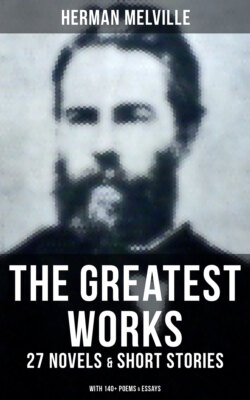Читать книгу The Greatest Works of Herman Melville - 27 Novels & Short Stories; With 140+ Poems & Essays - Herman Melville - Страница 262
На сайте Литреса книга снята с продажи.
CHAPTER 27 BABBALANJA FALLETH UPON PIMMINEE TOOTH AND NAIL
ОглавлениеTable of Contents
The levee over, waiving further civilities, we took courteus leave of the Begum and Nimni, and proceeding to the beach, very soon were embarked.
When all were pleasantly seated beneath the canopy, pipes in full blast, calabashes revolving, and the paddlers quietly urging us along, Media proposed that, for the benefit of the company, some one present, in a pithy, whiffy sentence or two, should sum up the character of the Tapparians; and ended by nominating Babbalanja to that office.
“Come, philosopher: let us see in how few syllables you can put the brand on those Tapparians.”
“Pardon me, my lord, but you must permit me to ponder awhile; nothing requires more time, than to be brief. An example: they say that in conversation old Bardianna dealt in nothing but trisyllabic sentences. His talk was thunder peals: sounding reports, but long intervals.”
“The devil take old Bardianna. And would that the grave-digger had buried his Ponderings, along with his other remains. Can none be in your company, Babbalanja, but you must perforce make them hob-a-nob with that old prater? A brand for the Tapparians! that is what we seek.”
“You shall have it, my lord. Full to the brim of themselves, for that reason, the Tapparians are the emptiest of mortals.”
“A good blow and well planted, Babbalanja.”
“In sooth, a most excellent saying; it should be carved upon his tombstone,” said Mohi, slowly withdrawing his pipe.
“What! would you have my epitaph read thus:—‘Here lies the emptiest of mortals, who was full of himself?’ At best, your words are exceedingly ambiguous, Mohi.”
“Now have I the philosopher,” cried Yoomy, with glee. “What did some one say to me, not long since, Babbalanja, when in the matter of that sleepy song of mine, Braid–Beard bestowed upon me an equivocal compliment? Was I not told to wrest commendation from it, though I tortured it to the quick?”
“Take thy own pills, philosopher,” said Mohi.
“Then would he be a great original,” said Media.
“Tell me, Yoomy,” said Babbalanja, “are you not in fault? Because I sometimes speak wisely, you must not imagine that I should always act so.”
“I never imagined that,” said Yoomy, “and, if I did, the truth would belie me. It is you who are in fault, Babbalanja; not I, craving your pardon.”
“The minstrel’s sides are all edges today,” said Media.
“This, then, thrice gentle Yoomy, is what I would say;” resumed Babbalanja, “that since we philosophers bestow so much wisdom upon others, it is not to be wondered at, if now and then we find what is left in us too small for our necessities. It is from our very abundance that we want.”
“And from the fool’s poverty,” said Media, “that he is opulent; for his very simplicity, is sometimes of more account than the wisdom of the sage. But we were discoursing of the Tapparians. Babbalanja: sententiously you have acquitted yourself to admiration; now amplify, and tell us more of the people of Pimminee.”
“My lord, I might amplify forever.”
“Then, my worshipful lord, let him not begin,” interposed Braid–Beard.
“I mean,” said Babbalanja, “that all subjects are inexhaustible, however trivial; as the mathematical point, put in motion, is capable of being produced into an infinite line.”
“But forever extending into nothing,” said Media. “A very bad example to follow. Do you, Babbalanja, come to the point, and not travel off with it, which is too much your wont.”
“Since my lord insists upon it then, thus much for the Tapparians, though but a thought or two of many in reserve. They ignore the rest of Mardi, while they themselves are but a rumor in the isles of the East; where the business of living and dying goes on with the same uniformity, as if there were no Tapparians in existence. They think themselves Mardi in full; whereas, by the mass, they are stared at as prodigies; exceptions to the law, ordaining that no Mardian shall undertake to live, unless he set out with at least the average quantity of brains. For these Tapparians have no brains. In lieu, they carry in one corner of their craniums, a drop or two of attar of roses; charily used, the supply being small. They are the victims of two incurable maladies: stone in the heart, and ossification of the head. They are full of fripperies, fopperies, and finesses; knowing not, that nature should be the model of art. Yet, they might appear less silly than they do, were they content to be the plain idiots which at bottom they are. For there be grains of sense in a simpleton, so long as he be natural. But what can be expected from them? They are irreclaimable Tapparians; not so much fools by contrivance of their own, as by an express, though inscrutable decree of Oro’s. For one, my lord, I can not abide them.”
Nor could Taji.
In Pimminee were no hilarious running and shouting: none of the royal good cheer of old Borabolla; none of the mysteries of Maramma; none of the sentiment and romance of Donjalolo; no rehearsing of old legends: no singing of old songs; no life; no jolly commotion: in short, no men and women; nothing but their integuments; stiff trains and farthingales.
